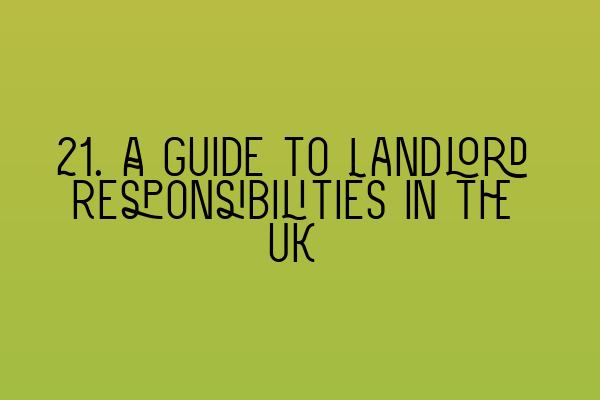21. A Guide to Landlord Responsibilities in the UK
Welcome to SQE Property Law & Land Law, where we strive to provide comprehensive legal advice and insights on a wide range of property-related matters. In this article, we will discuss the essential responsibilities of landlords in the UK. Whether you are a new landlord or have years of experience, it is crucial to understand your obligations to ensure a smooth and compliant tenancy. Let’s dive in!
1. Providing a Safe and Habitable Property
As a landlord, one of your primary responsibilities is to provide a safe and habitable property for your tenants. This means ensuring that the property meets all safety regulations, such as having proper fire safety measures in place, adequate ventilation, and a functioning heating system.
Related Article: SQE 2 Preparation Courses
2. Repairing and Maintaining the Property
It is your duty as a landlord to promptly address any necessary repairs and maintenance issues that arise during the tenancy. This includes fixing faulty plumbing, electrical systems, and any structural damage. Regular inspections can help identify and resolve these issues before they escalate into major problems.
Related Articles: SQE 1 Practice Exam Questions, SQE 1 Practice Mocks FLK1 FLK2
3. Ensuring Gas and Electrical Safety
By law, landlords are required to get an annual gas safety check conducted by a Gas Safe registered engineer. The certificate should be provided to tenants before they move in and should be renewed annually. Similarly, it is essential to ensure the electrical safety of the property by conducting regular checks and obtaining an Electrical Installation Condition Report (EICR).
4. Protecting Tenancy Deposits
If you take a tenancy deposit from your tenants, it is imperative that you protect it in a government-approved deposit protection scheme. This scheme ensures fair treatment for both landlords and tenants and offers a dispute resolution service in case of disagreements over the deposit at the end of the tenancy.
5. Complying with Tenancy Deposit Regulations
Along with protecting the deposit, landlords must also comply with tenancy deposit regulations. This includes providing tenants with prescribed information about the deposit protection scheme within 30 days of receiving the deposit. Failure to comply with these regulations can result in penalties and legal consequences.
6. Conducting Right to Rent Checks
Prior to letting a property, landlords must conduct Right to Rent checks to ensure their prospective tenants have the legal right to live in the UK. This involves verifying the immigration status of tenants and keeping appropriate documentation as evidence of compliance.
7. Providing Rent Book or Statement
Landlords must provide their tenants with a rent book or a written statement that includes important details such as the amount of rent, payment due dates, and information regarding any additional charges. This ensures transparency and helps both parties keep track of their financial obligations.
8. Complying with Fire Safety Regulations
Fire safety is of utmost importance in rental properties. Landlords must comply with fire safety regulations, which may include installing smoke detectors, carbon monoxide alarms, and ensuring safe fire escape routes. Regular checks should be conducted to ensure these safety measures are in working order.
9. Resolving Tenant Complaints Promptly
If a tenant raises a complaint or reports an issue, it is the landlord’s responsibility to address it promptly and efficiently. Failure to resolve tenant complaints in a timely manner can lead to strained relationships and potential legal disputes.
10. Complying with Health and Safety Regulations
Landlords have a legal obligation to meet health and safety regulations in the rental property. This includes maintaining a clean and well-maintained environment, free from hazards that may harm tenants. Regular inspections can help identify potential safety risks and ensure compliance.
Conclusion
Being a landlord comes with a range of responsibilities, all aimed at providing a safe and comfortable living environment for tenants. By understanding and fulfilling these obligations, you can build a positive landlord-tenant relationship and ensure long-term success in the rental market.
For more information and resources on property law, check out our related articles: SQE 1 Preparation Courses, SRA SQE Exam Dates. If you require professional legal assistance or have specific questions regarding landlord responsibilities, do not hesitate to contact SQE Property Law & Land Law. Our team of experts is here to help you navigate through the complexities of property law.
